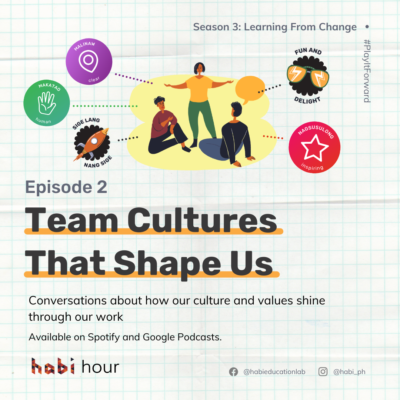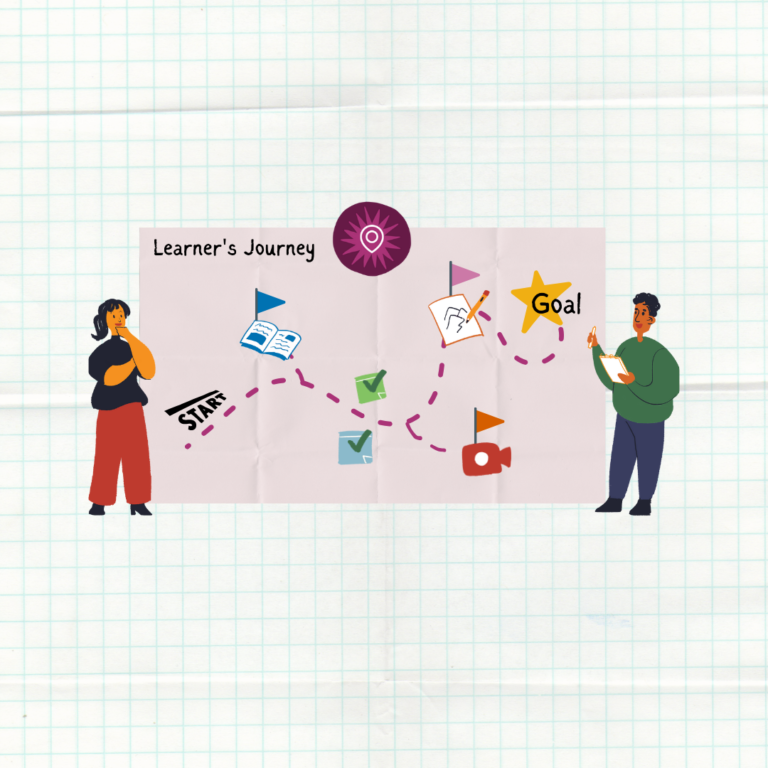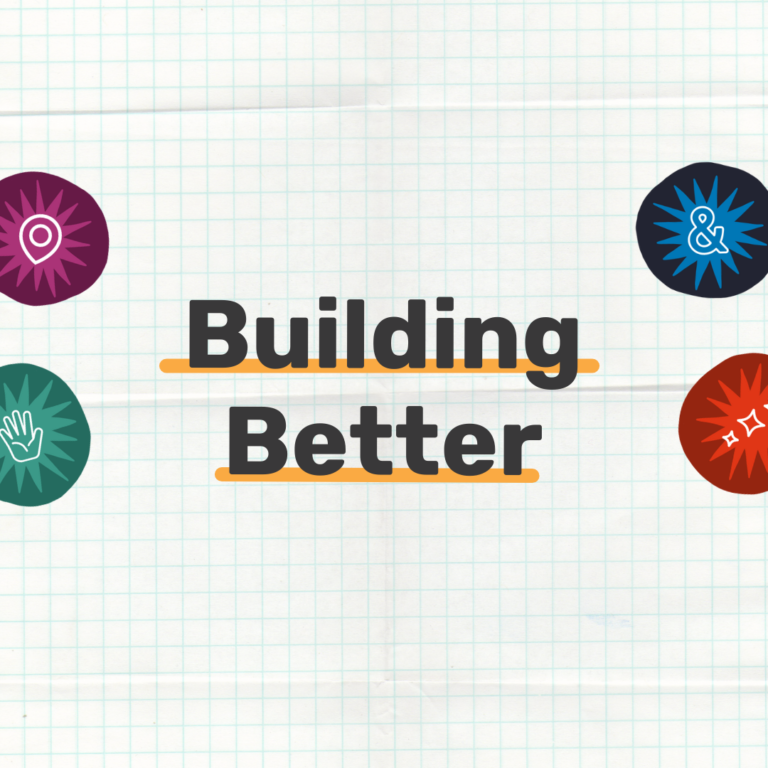Conversations about how our culture and values shine through our work

Overview
10 December 2021 | 17 min and 40s
We opened Habi Hour’s Learning From Change series by talking about the things that made Habi unique as a workplace. In Episode 2, LXDs Kimmy, Lacey, and Luigie talk about the culture and values that shape our ways of working, and how these help us do our best work.
Transcript
Introductions
[Laughter and light banter]
Kimmy (voice over): What do you remember when you first came into Habi?
Lacey: Very welcoming ’yung onboarding. Naalala ko nu’ng 2017, sama-sama lang d’un sa Habi HQ natin. Tapos isa sa parang surprise na binigay nila sakin nu’ng time na ’yun, may calling card ako agad! Eh first time ever ko magkaroon ng calling card sa buong buhay ko. Dahil di ba? Hindi naman ako nagco-calling card dahil teacher, di ba? Parang ’yung thing na ‘yun signifies na, “wow, meron akong ano, may pagkakakilanlan ako sa organization na ’to.” May nakalagay d’un na “learning experience designer.
Luigie: Sa simula pa lang binibigay na ’yung culture and values ng Habi. And ito, surprising for me ’yung culture and values kasi that’s what makes it different from other organizations. Kasi simula pa lang pinapakita na nila sa’yo, ano ba talaga ang Habi, bakit iba ang Habi. Kasi nga meron tayong culture and values na ganito.
Kimmy: After a few weeks I learned na, ang laki din kasi talaga ng trust sa Habi. I guess ’yung trust ng leadership sa atin, sa mga part ng organization, na gagawin naman ’yung mgakailangan gawin. Gagawin naman nang mabuti, gan’yan.
MUSIC: Habi Hour Intro
Kimmy (voice over): In episode 1, LXDs shared the 7 fun facts about working with, for, and, in Habi. We talked about what’s unique in Habi and learned how to embrace these significant changes in a very different kind of workplace. In this episode, let’s continue to talk about how these work cultures changed the perspective of LXDs and how these shape us.Kimmy (voice over): Hi! Ako si Kimmy, Habi LXD. Let’s follow fellow LXDs Lacey and Luigie’s journey in discovering what Habi’s culture and values mean to them.
Initial Impressions of Habi
Kimmy (voice over): We first talked about initial impressions when we were onboarded in Habi.
[light guitar strums]
Lacey: Ah, sige. ’Yung isa sa mga na-surprise ako, ’yung wala silang, hierarchy. Wala silang boss. Naramdaman ko yung organization na pantay-pantay sila lahat. Oo, meron tayong head director, pero hindi mo mafi-feel na lahat nu’ng decision making sa kan’ya lang.
Luigie: ’Yung mga circles na tinatawag natin sa Habi, na each of these circles are equal. And ’yung feeling na ‘to sobrang mahirap i-navigate for somebody who’s used to asking for permission, kailangan mong magpaalam sa boss, kailangan mo munang magpaalam sa mga supervisor. May gan’un pa ring feeling na, “Ay, kailangan ko pa bang ipa-approve itong work ko? Kailangan ko pa itong ipakita? Kailangan pa ba ng general approval bago ko i-share sa larger team?” So ’yung holacracy in a way for me was helpful kasi it made me feel like empowered coming from a different workplace. Sa Habi mas naramdaman ko din na I am part of the decision-making. Kasi ’yun nga, since holacracy (means) equal voices. Your voice is being heard, and you are valuable to the general direction of the organization.
[light, upbeat drum music]
Kimmy (voice over): Holacracy ’yung pag-distribute ng decision-making sa teams or sa circles.
Kimmy (voice over): Even as newcomers, the trust in each other to make decisions for the welfare of the organization and us as individual LXDs was evident.
Intellectual Humility and Collective Flourishing
Kimmy (voice over): As months or years go by, Habi’s culture and values shine brighter. These cultures and values are aimed at developing us, LXDs. When we grow, the organization grows. When the organization grows, it shines through our work, too.
This kind of interconnectedness and domino effect is reflected through how our values were framed: developing the self and then flourish as a team.
We talked about intellectual humility and collective flourishing.
[light guitar strums]
Lacey: I guess kasama sa intellectual humility, ’yung walang nag-iisang expert kasi alam natin na lahat tayo nanggaling sa iba’t ibang practices, iba’t ibang experiences, so nadadala natin ’yun. Bawat isa, may contribution sa larger goal ng ating organization.
Luigie: Kasama na rin siguro ’yung another mindset or another culture and values natin ’yung collective flourishing na kitang kita mo siya in a flat organization. Kasi parang ’yung growth ng isa is a contribution of everyone in the organization.
Kimmy (voice over): These values, intellectual humility and collective flourishing, are all about the LXDs — knowing your strengths, but also knowing that there are spaces in which to grow. One way for us to find out is through metacognition and feedback
Luigie: ’Yung feedback talga is a buzz word or a very important part of the culture of Habi. Kasi nga naalala ko nga itong feedback, kasi nga, mahalaga ito, kasi it also gives emphasis d’un sa intellectual humility.
Sige lang nang Sige Attitude and Evolutionary Processes
Kimmy (voice over): And then, we dove right into sige lang nang sige attitude and evolutionary processes.
[light guitar strums]
Lacey: Isa rin sa na-notice ko nu’ng bago ako, yung ang lakas talaga ng sige lang nang sige ano nila, attitude. Free ’yung mga LXDs na mag explore, na mag-ano ng mga, kanilang mga expertise, mag-share.
Luigie: Kasi for example, ako nasa Lingon circle, and ’yung Lingon circle is in charge of data, research, insights, monitoring and evaluation. Itong L circle weekly check-in na meron tayo, and then ’yung work natin mismo sa L circles natin, for me it’s a space for experimentation, space for me to add my own flavor to the organization. Somebody na may background in research, background in data, nag-e-enjoy sa M&E, ito ’yung space ko talaga to meet like-minded peoples, to brainstorm with people who think the same the way I do. And maganda itong space na ’to, itong L circles na kinakabilangan natin, to help us develop our interests, and to further solidify our contribution to the organization. So yan, kasama ko ’yan si Kimmy sa Lingon. Nakakatuwa ’yung space na ’yun, kasi at least d’un, focused talaga ’yung usapan ninyo sa same ideas, same rationale, same purpose for the organization.
Kimmy: Gets! Oo nga, maganda nga ’yung L-circles as space for experimentation.
[light, upbeat drum music]
Luigie: L circles, which technically is parang yung internal departments natin sa Habi.
Lacey: Oo nga, nade-develop din sa atin ’yung pagkakaroon ng initiative. Ang example dito, sa Habi, may tinatawag tayong Habi Channels kung saan ito ’yung malinaw na ehemplo ng biased towards action natin. Sa Habi Channels mas ginagawa nating accessible ’yung mga nating nating ituro sa karamihan. Meron tayong accessible learning modules sa Habi Plus. Meron tayong mga learning insights from Habi Hour. At meron din naman tayong live synchronous workshops sa Habi Live. At isa din sa biased towards action at initiative na ginagawa ang Habi ay pagkakaroon ng learning tools na magagamit ng ating mga educators, and trainers, and everyone who wants to learn more about learning experience design and design thinking. Under ’yun sa Habi Shop. So far meron tayong LX Blocks, Manghahabi Cards, and the Check-in Playbook.
Luigie: I think related din to d’un sa another value natin na evolutionary processes, kapag meron tayong Huddulo, or ’yung end of the month gathering ng Habi, meron tayong portion sa Huddulo natin na governance proposals. And ito, isa to sa pinakanakakatuwa at nakaka-amaze as a newcomer to Habi, na merong gan’ung monthly space for evolution, evolution ng mga proseso, evolution ng mga roles, evolution ng mga trabaho natin in Habi. Na may space every month na papakinggan ng lahat, kung merong somebody na may proposal para maging mas maayos, mas maganda yung relationships sa organization, maging maganda ’yung ways of working and processes.
Kimmy: Oo. So ’yun importante ’yung mga tools na gan’un, ’yung governance proposals, ’yung governance evolution para talagang litaw ’yung value natin, ’yung how much we value ’yung processes natin, ’yung evolutionary processes in our organization.
Kimmy: So napag-usapan natin kanina ’yung feedback. Way rin ito to flesh out and process ’yung tensions. Way ito para mas mapabuti ’yung systems natin. Related also ito sa holacracy, na everyone has a hand in improving our systems kasi in a way trained tayo to see these tensions ourselves. So ’yung tensions na titingnan natin, hindi para mang-bash, pero as a signal that we can do better in that area.
Feedback ’yung hinahanap natin, hindi approval.
Curiosity for Human Experiences and Fun and Delight
Kimmy (voice over): Last but not the least, we looked into curiosity for human experiences and fun and delight.
[light guitar strums]
Kimmy: So speaking of areas to do better din, one thing we really value is the lived human experience. Tapos sa atin sa Habi, for us to know that lived experience, and ultimately kung paano tayo makakatulong gumawa ng solutions is that curiosity: curiosity for human experiences. Kunwari, ’yung sa MISMO framework, ’yung , di ba, ’yung ‘S’ means starting context. So isa ’yun sa mga importanteng kailangan natin malaman about stakeholders, or kung para kanino ba tayo nagde-design, the community, tayo rin as LXDs.
Lacey: With regards to valuing human experiences, dahil high on empathy ’yung mga usually ginagawa namin sa Habi, meron kaming mga worksheets exercising empathy like ’yung Empathy Map na meron kaming downloadable version sa aming website. At gumawa pa mismo kami ng Check-in Playbook where we share the gift of empathy through check-in prompts na ginagamit rin namin personally sa Habi, na madalas naming gamitin actually sa mga workshops.
Kimmy: Actually yung isang magandang point, isa ring magandang use ng check-ins and check-outs natin is to practice empathy, di ba? To meet our participants or to meet the team where they are. Ayun, ’yung para lang malaman kung ano ’yung current context, kung ano ’yung current na situation ng tao, para mas madali, mas malaman natin kung paano sila pakitunguhan during the huddle or during whatever activity na papasukan natin.
Lacey: Or para rin malaman natin kung bakit gan’un ’yung energy n’ya coming to the huddle. Kasi di ba minsan may mga huddle tayo na kailangan mag-ambag, pero kapag nalaman natin na yung feeling pala nu’ng isang teammate natin ay low energy, na hindi muna s’ya makaka-ambag in a certain collaboration activity, makikita natin during check-ins.
Luigie: Dagdag ko lang din na sobrang helpful for somebody like me na bago na nga sa organization, tapos online pa ’yung naging first engagement sa Habi, at sa totoo lang na never ko pang na-meet ’yung mga tao sa Habi in-person.
Kimmy: [Laughs] Oo nga!
Lacey: [Laughs] Totoo nga pala ’to!
Luigie: Tapos alam n’yo ba na through check-ins and check-outs ko lang talaga mas nakilala ’yung mga tao sa Habi?Kimmy (voice over): So, our curiosity for human experiences is not just curiosity for curiosity’s sake. We use what we learn from these people to know what their motivations are, what will work for them, hopefully to inject our design with their version of fun and delight.
Synthesis
[light music]
Kimmy (voice over): So there you have it: Intellectual Humility, Collective Flourishing, Sige lang nang sige attitude, Evolutionary Processes, Curiosity for human experiences, and Fun and Delight. Parang ang hirap i-memorize. But for us, these are not just buzzwords; these are not just fluff. This is us. This is how we live out our advocacy for well-designed learning experiences. This is what makes us Habi.
Although mahirap talaga silang i-single out, all are connected to each other. But maybe to give a clear picture of how some of these translate in our work…
[light guitar strums]
Luigie: Isa sa mga naging mahalagang value, team culture and value na laging tinatanganan natin when we design workshops in Habi Live is fun and delight. Kasi alam naman natin na ’yung usual complaint ng mga tao since nga naka-online na tayo, ang dami-dami na nating Zoom webinars na ina-attendan, ang dami-dami na nating mga worksop na in-attendan, and for some people nagiging monotonous, tiring, taxing, boring na ’yung mga workshop. So kami sa Habi Live, ang ginawa namin is ginamit namin itong value natin, itong team culture and value natin na fun and delight para mas magkaroon tayo ng redesigning ng mga learning experiences, synchronous learning experiences.
Lacey: Kapag gumagawa tayo ng mga workshop na may mga similar LXs, litaw na litaw ’yung evolutionary processes lalo na sa pag-iterate ng mga LXs na ’yun based din d’un sa previous experiences natin handling different participants. Tapos makikita mong nagba-bank on din tayo sa mga feedback and suggestions, na gamit din siyempre ’yung mga feedback tools natin. We listen to the participants tapos ini-improve talaga natin, kumbaga may evolutionary process in everything.
MUSIC: Habi Hour Outro
Kimmy (voice over): When asked which ones they resonate with the most…
Luigie: Intellectual humility, kasi marami akong natutunan sa Habi, at marami din akong kasalukuyang natututunan at matututunan pa sa Habi. And itong intellectual humility is a reminder that we are in a constant position of learning together, with each other in Habi.
Lacey: Sa akin naman, siguro value ng curiosity for human experiences. Meron lang talaga akong desire to listen to what they are saying or to learn from them.
Kimmy: Ako actually, sasabihin ko na sa Evolutionary process. Nakikita ko importante yun kasi tao tayo. We’re humans. Hindi tayo static. Lahat tayo naggo-grow. Lahat tayo may changes na pinagdadaanan. That’s what I resonate with kasi, ayun nga, hindi tayo magsi-stay d’un sa mga processes, dun sa mga sitwasyon na hindi nakakabuti. We find ways to evolve ganyan as an organization, as individuals, as LXDs.
[Habi Hour ending music fade out]


